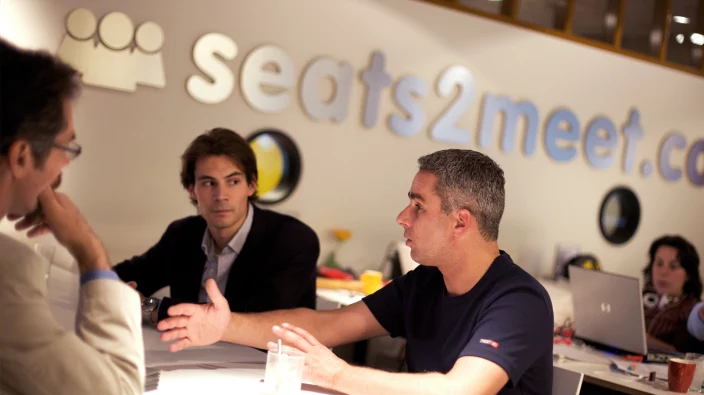Why did we select this case?
Seats2meet constitutes an example of a company that enhances the benefits of coworking communities and digital technologies through the creation of an offline knowledge sharing network with location based services. By making more physical spaces available for independent workers, Seats2meet facilitates social encounters and connection within the city.
About the Case
What?
Seats2meet was launched in 2005 by Ronald van den Hoff and Marielle Sijgers. The company covers different type of physical spaces including shared offices, business centers, golf course, hospitals, museums, or cafes. Overtime, Seats2meet has expanded their roles from running an online tool for space reservation to creating mobile application, building the Serendipity machine, as well as organising global meetups.
How?
Through the platform, users can find their preferred location, reserve time, sign in at the coworking space and sign out when their time is over. Venue participants offer their space to coworkers at no cost. However, there is a small amount of fee to be charged when users register for a premium service or wish to hold an event or a meeting.
Why?
The founders believe that value can be added in any physical space, if it is connected to the knowledge community. In this sense, values are not only limited to economic profit gained from seats reservation but the diversity of knowledge and skills that coworkers are able to share with each other.
Where?
Utrecht based, worldwide network.
 PHOTO: FLICKR USER SEBASTIAAN TER BURG
PHOTO: FLICKR USER SEBASTIAAN TER BURG
Impact
According to the results from this study performed by researchers from Erasmus University coworking leads to positive outcomes for the workspace users. Coworking contributes to improving current products and services (34%), expanding customer networks (30%) and the development of business skills (38%). Additionally, working at Seats2meet can also help in finding a job or a temporary assignment, as indicated by 16% of the respondents. These outcomes show that the value of a co-working space go beyond providing a suitable place to work.
Want to know more?
- Site seats2meet: https://seats2meet.com/en
- Contact: myown@seats2meet.com
- About the serendipity machine: http://serendipitymachine.com/
